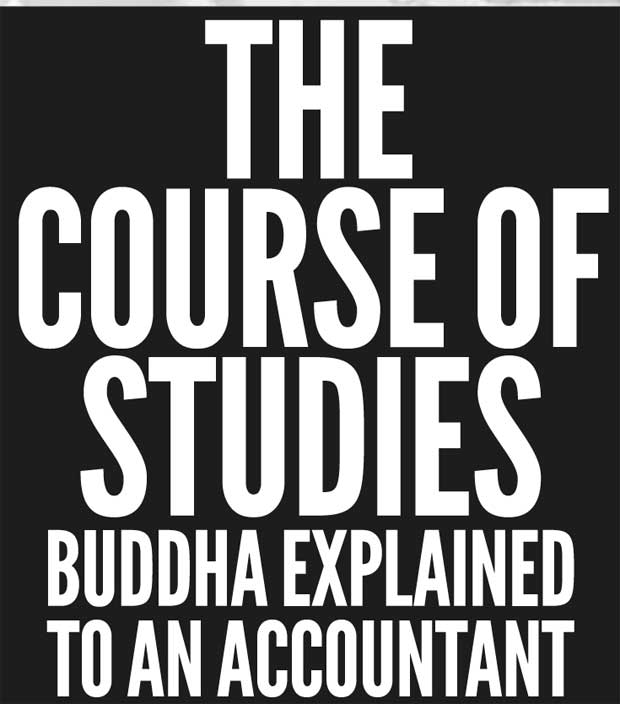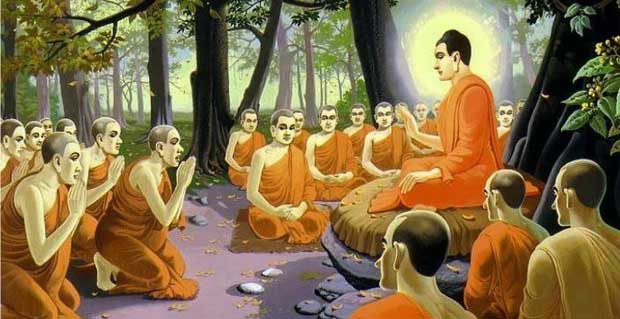Reply To:
Name - Reply Comment
Last Updated : 2024-04-25 09:32:00

Once when the Buddha was staying at the storeyed monastery house built by MigaraMatha, in the East Park of Shravasti, a Brahmin Accountant named Moggallana, paid a visit to the Exalted One.
The Brahmin having paid due respects sat down before the Buddha and raised a point pertaining to their course of studies according to ‘Vedas’.
He said, “Worthy Master, just as one gets a gradual view of this storeyed building, a progress, a graduate path and so on right up to the highest of the stair case. Just so, is the progressive training we Brahmins receive in our course of study in the Vedas.
Sir, just as in the course of archery, with us the Brahmin’s training, the progress, the approach is step by step.
For instance, in counting when we take a private pupil we make him count as “One One, Twice Two, Thrice Three, Four time Four and so on up to one hundred.
Now Sir, is it possible for you to point to a similar progressive training on the part of your followers in your Dhamma?”
Elementary Lessons
The Buddha replied, “Brahmin it is so” and cited the case of a cleaver horse – trainer. At first he takes the thoroughbred in hand, gives him his first lesson with bit and bridle and then proceeds to the further course.
“Just so, Brahmin, the Tathagata takes in hand a man who is to be trained and gives him his first lesson.”
Come thou brother! Be virtuous. Abide, constrained by the restraint of the obligation. Become versed in the practice of right behavior, seeing danger in trifling faults, you do undertake the training and, be a pupil in the moralities. Dhamma is morality. Morality is Dhamma.
No sooner he has mastered all that, the Tathagata gives him his second lesson.
Come thou brother. Seeing an object with the eye, be not charmed by its general appearance or its details.
“Persist in the restraint of that dejection that came from craving, caused by the sense of sight uncontrolled, these ill states, which would overwhelm one like flood. Guard the sense of sight, win control over the sense of sight.” Accordingly, so do with the other organs of sense.
When you hear a sound with the ear or smell scent with the nose, taste a taste with the tongue or with body touch things tangible, and when with mind you are conscious of a thing, be not charmed with its general appearance or its details.
No sooner he has mastered all that, the Tathagata, gives him further advice.
Come thou brother, Be moderate in eating, earnest and heedful do take your food, not for sport indulgence, not for adding personal charm or comeliness to body, but do it for the body’s stabilizing, for its support, for protection from harm, and for keeping up the practice of the righteous life with the thought;
“I check my former feeling. To no new feeling will I give rise, the maintenance and comfort may be mine.”

“Brahmin, once he had learnt to moderately consume food, the Tathagata gives him the lesson on watchfulness.
“Come Thou, brother, Abide given to watchfulness.”
During day time when walking or sitting purify your mind from thoughts and events that may hinder. At night spend the First Watch, pacing too and fro or sitting mindfully.
During Second Watch lie down on the right side in the posture of a lion, placing one foot upon the other mindful and self possessed. Thus set your mind positively on the idea of exertion.
During the Third Watch, rise up and walking up and down, or sitting keeping mind away from negative thoughts.
Then Brahmin, once the brother is thorough to watchfulness the Tathagata teaches him how to be possessed of mindfulness and self control.
In going forth or going back, have yourself under control. In looking forward or looking back, in bending or relaxing, in wearing robes or carrying robe and bowl, in eating, chewing, tasting, in easing yourself, in going , standing, sitting, lying sleeping or waking, in speaking or keeping silence have yourself under control.’
Practice of Ecstasies
“Then Brahmin, when he is possessed of self-control, the Tathagata gives him a further lesson thus: ‘Come thou, brother! Seek out a secluded lodging, a forest or root of a tree, a mountain or a cave or a mountain grotto, a charnel field, a forest retreat, the open air, a heap of straw.’ And he does so. And when he has eaten his food he sits down cross-legged, and keeping his body straight up, he proceeds to practice the four ecstasies.’
“Now, Brahmin, for all brothers who are pupils, who have not yet attained mastery of mind, who abide aspiring, for such is the manner of my training.’
“But as to those brethren who are arhants, who have destroyed the ‘asavas’, who have lived the life, done their task, laid down the burden, won their own salvation, utterly destroyed the fetters of becoming, and are released by the perfect insight, for such as those these things are conducive to ease in the present life and to mindful self-control as well.’
Out in a secluded lodging, a forest or foot of a tree, a mountain or a cave or a mountain grotto, a charnel field.
Do All Attain the Sublime State?
Then the Accountant Moggallana, raising a point querried“Master Gautama, do the disciples of worthy Gautama do all of them attain the Sublime Bliss?”
The Buddha replied some of my disciples thus trained and adviced by me, do so attain the supreme goal, some do not.
“When there is Nibbhana and when we have the path to Nibbhana and when we have the worthy Gautama, to instruct what is the reason for some disciples thus advised and trained do attain Nibbhana, while others do not attain?
Then the Buddha replied Brahmin, before I answer to you, could you answer to my question first?
Q. Brahmin are you well skilled in the road to Rajagaha?
A. Ven. Master, certainly I am skilled. “Well then brahmin, when you instruct a person the proper way to Rajagaha is North and yet he takes wrong way and goes to West.
Then a second person who comes to you for your instructions for the same request, follow your advice and safely reach Rajagaha. Brahmin, Tathagata expounded the Dhamma and he shows you the path to Nibbhana. “By oneself alone evil is done: by oneself is one defiled. By oneself alone is evil avoided: by oneself alone is one purified.
“Purity and impurity depends on oneself. No one can purify another” (Dhammapada)
Buddhism appeals to the intellectual mind. “MagnaCarta” of Buddhism is mindfulness, a Buddhist is  totally independent to exercise his free will and embrace the Truth. Besides Buddhism does not demand blind faith from its followers. The Buddha exhorted his disciples to seek the Truth, and not to heed mere persuasion even by superior authority.
totally independent to exercise his free will and embrace the Truth. Besides Buddhism does not demand blind faith from its followers. The Buddha exhorted his disciples to seek the Truth, and not to heed mere persuasion even by superior authority.
In the Majjhima Nikaya the Buddha emphasized that “One thing only does the Buddha teach, namely suffering and cessation of suffering”
“This doctrine is profound, hard to see, difficult to understand calm, sublime, not within the sphere of logic, subtle.
To be understood by the wise, “As the wise test gold by burning, cutting and rubbing it on a piece of touchstone, so are you to accept by words after examining them.
“Well expounded is the Dhamma by the Exalted One.
To be self realized with immediate fruit, inviting investigation, leading on to Nibbhana,
To be comprehended by the wise, each for himself”
On another similar occasion, Kalamas a group of Brahmins from Kesaputta, visited the Buddha. Kalamas said that many ascetics and Brahmins who preached to them used to exalt their own doctrines and denounce those of others and that they wish to clarify, which of those sayings were right.
“Yes, O Kalamas, it is right for you to doubt, it is right for you to waver. In a doubtful matter, wavering has arisen,” remarked the Buddha and gave them the following advice which applies with equal force to modern rationalists as it did to those sceptic Brahmins of yore.
Come, O Kalamas, Do not accept anything on mere hearsay (i.e., thinking that thus have we heard it from a long time). Do not accept anything by mere tradition (i.e., thinking that it has thus been handed down through many generations). Do not accept anything on account of rumours (i.e., by believing what others say without any investigation). Do not accept anything just because it accords with your scriptures. Do not accept anything by mere supposition. Do not accept anything by mere inference. Do not accept anything by merely considering the appearances. Do not accept anything merely because it agrees with your preconceived notions. Do not accept anything merely because it seems acceptable.
Do not accept anything thinking that the ascetic is respected by us (and therefore it is right to accept his word.)
“But when you know for yourselves – these things are immoral, these things are blameworthy, these things are censured by the wise, these things, when performed and undertaken, conduce to ruin and sorrow – then indeed do you reject them.
“When you know for yourselves – these things are moral, these things are blameless, these things are praised by the wise, these things, when performed and undertaken, conduce to well-being and happiness – then do you live and act accordingly.”
Most Ven. Narada Maha Thera, explaining the characteristics of Buddhism writes, “Buddhism is neither totally pessimistic nor totally optimistic but realistic.
One would be justified in calling the Buddha a pessimist, if he had merely emphasized the truth of suffering without suggesting a means to end suffering and gain eternal happiness.
The Buddha prescribed a remedy for this universal sickness of humanity the highest conceivable happiness the total extinction of suffering.” Conquering of suffering results in eternal happiness.
Suffering leads to Confidence (Saddha); Confidence to Rapture (Pamojja); Rapture to Joy (Piti); Joy to Tranquility (Passaddhi); Tranquility to Happiness (Sukha); Happiness to Concentration (Samadhi); Concentration to Knowledge and Vision of things as they truly are (Yathabhutananadassana); the Knowledge and Vision of things as they truly are to Repulsion (Nibbida); Repulsion to Non-attachment (Viraga); Non-attachment to Deliverance (Vimutti); Deliverance to the Extinction of Passions (Khaye-Nana); i.e, to Arahantship.”
This important passage clearly indicates how suffering can lead to happiness and ultimately to Sainthood. The Buddha stressed that “Santutti Paramam Dhanam” (Happiness is the greatest wealth). As such Buddhist are not expected to be constantly brooding on the ills of life and make their life unhappy.
According to Encyclopedia Britannica ‘Pessimism’ is thus described.
“Pessimism denotes an attitude of hopelessness towards life, a vague general opinion that pain and evil predominate in human affairs. The original doctrine of the Buddha is in fact as optimistic as any optimism of the West. To call it ‘pessimism’ is merely to apply to it a characteristically Western Principle according to which happiness is impossible without personality. The true Buddhist looks forward with enthusiasm to absorption into eternal Bliss.”

I first heard this teaching of ‘beginning again’ a few months ago taught by meditation teacher Sharon Salzberg, towards whom I have the greatest respect. It made so much sense to me. Practicing beginning again has also helped me tremendously in the way I act and deal with almost every situation in life. Reality and living is not a fixed unshakable entity. One can always improvise in life and improvising here would mean beginning again.
For example, let’s say, two people are having a conversation and one of them says something hurtful to the other. In my instance, the more a person tries to hurt me, the more compassionate I become. In my heart I have already forgiven the person for trying to hurt me. And I practise forgiveness. I also practise being extra kind to that person. -In a way, I am beginning again. I’m re- building the relationship. However, it is important to acknowledge that I’ve been hurt. And it’s important to let the other know in a kind and gentle way that one has been very hurt.
In relation to the topic of anger, I am reminded of the story of the angry demon.Once upon a time, there was a kingdom governed by a very wise king.One day an enormously huge, ugly and ferocious demon broke into the kingdom and entered the palace. The guards tried to stop him, but he was too  powerful for the whole lot of them. He broke into the palace and entered the congregation hall where the king was holding a meeting with his ministers. He exhaled fire and threatened to bring the whole kingdom down to ashes if the king didn’t resign his throne and kingdom to him. Now the king was a very wise king. He first asked the demon, ‘ You look very tired and exhausted, would you like a cup of tea?’ the demon was enraged. “Cup of tea my foot. I don’t need no cup of tea”, was his response. But the king didn’t stop there. The demon was frothing with anger and was spitting out fire. The king then spoke and said, “ Please take a seat- your feet must be hurting with all that standing”. Now all the other ministers were clever enough to realise that the king was practising loving kindness towards the demon. They took his queue and one of the ministers held the demon’s hand and helped him to take a seat on the throne. The demon at that started shrinking in size. Another minister came and started massaging the demon’s feet. He was doing it so well that the demon was in bliss. And what’s more he started shrinking rapidly. Another minister gave him a shoulder rub. Another sponged his face of all the sweat. The demon, shrank and shrank and finally became so small, he was hardly visible to the onlookers, and suddenly disappeared into thin air. That was the end of the angry demon, and the kingdom was saved thanks to the very wise King.
powerful for the whole lot of them. He broke into the palace and entered the congregation hall where the king was holding a meeting with his ministers. He exhaled fire and threatened to bring the whole kingdom down to ashes if the king didn’t resign his throne and kingdom to him. Now the king was a very wise king. He first asked the demon, ‘ You look very tired and exhausted, would you like a cup of tea?’ the demon was enraged. “Cup of tea my foot. I don’t need no cup of tea”, was his response. But the king didn’t stop there. The demon was frothing with anger and was spitting out fire. The king then spoke and said, “ Please take a seat- your feet must be hurting with all that standing”. Now all the other ministers were clever enough to realise that the king was practising loving kindness towards the demon. They took his queue and one of the ministers held the demon’s hand and helped him to take a seat on the throne. The demon at that started shrinking in size. Another minister came and started massaging the demon’s feet. He was doing it so well that the demon was in bliss. And what’s more he started shrinking rapidly. Another minister gave him a shoulder rub. Another sponged his face of all the sweat. The demon, shrank and shrank and finally became so small, he was hardly visible to the onlookers, and suddenly disappeared into thin air. That was the end of the angry demon, and the kingdom was saved thanks to the very wise King.
The moral of the story is that anger can never be successfully overcome with anger. As the Buddha said, anger can be conquered only by loving kindness or metta. Metta is a very powerful thing, Once again, it’s a practice of beginning again. When the demon entered the palace and threatened everybody, the king ‘began again’ by practising loving kindness. The ministers ‘ began again ‘ by being kind and compassionate to the demon. Beginning again doesn’t have a time. One can begin again at Any Time. That’s the beauty of it. You can always, begin again in life. It’s a conscious decision one can do over and over and over again. Beginning again implies initiating a new stream of events with the conscious decision to change the present situation or to improve a current situation in one’s life.
In reference to the word ‘demon’ - there are ‘demons’ in our minds. Anger is just one of them. There could be other demons like jealousy, annoyance, irritation, envy etc. What is important is to acknowledge whatever ‘demon’ arises and be mindful that it has arisen and not act it out. That is the hard part. Using loving kindness towards oneself in this instance would be very helpful. Loving kindness is not a mushy thing. It is Very Hard to practice at times. One should never underestimate the effort that is needed to practice loving kindness.
If a person is angry, normally the other person will likewise react with anger. However, if one has been successfully practising loving kindness towards all, then the immediate response is forgiveness and love. Where there is forgiveness and love, something amazing takes place, and that is that there isn’t any propagation of unpleasantness. Instead, there’s this beautiful feeling of love and oneness. If the compassionate person refuses to react negatively with anger, then the problem should naturally resolve by itself and there’s peace there. Very Real Peace.Where there is loving kindness there is also forgiveness and peace. There is also equanimity there. Equanimity can be interpreted as Right Balance. Seeing things in perspective. Not getting deluded by Ignorance.
In a world with so much to fear, violence unsurpassed, it’s not easy to be always forgiving. However, one can always be kind. Even in thought towards those who inflict harm on others and more so on themselves. Karma in Buddhism states that there are consequences to one’s actions be they good or bad acts, in thought word or deed and one has to suffer the consequences. It’s always good not to have a mean bone in one’s body. ( Metaphorically speaking.) As a mother, if someone harms my son, it’s not going to be at all easy for me to think kindly towards whoever who has harmed him. It’s going to take a lot of strength on my part to even practice forgiveness. However, I’d rather practice forgiveness than burst out in anger because that’s only going to make matters worse with no real solution. I can practice forgiveness in my heart and take appropriate action to protect my son in the future from similar people.
As children, we take our cues from our parents and elders. We emulate those who make an impression on us while growing up. As parents, it’s our collective duty to teach our children not to hate. Hate doesn’t do any good whatsoever. Hating is a very destructive emotion. We should be kind towards all without hating anyone. If someone hates us, it’s going to be very hurtful to one.
For example, there are problems and issues among siblings. There’s jealousy and anger. There are misunderstandings. I am an only child and I don’t know what it’s like to have siblings. However, when I see conflicts among siblings in other people’s lives, I somehow can’t help thinking that personally - and I repeat, personally it’s bliss being an only child. I doubt I’d be happy to have a sibling who hated me for no real reason of my own.One can make up one’s mind not to act out in anger and cause hurt to a loved one in future. Especially a loved one.
What I keep telling myself and others is that it’s always good to be good. It’s not easy. At times, one can be severely challenged. However, practising virtues and living a noble and healthy life, not harming others is truly the way to live. We should show kindness not only towards human beings but towards all life as well, and this includes all of Mother Nature. We need plants and animals for our survival.With out either, life would be so monotonous and would come to a halt. They add beauty and depth and should be a priority in people’s lives.
All that I’ve mentioned above are qualities I myself strive to practice in my own life. I hope they’ll help you in your own.

Add comment
Comments will be edited (grammar, spelling and slang) and authorized at the discretion of Daily Mirror online. The website also has the right not to publish selected comments.
Reply To:
Name - Reply Comment
US authorities are currently reviewing the manifest of every cargo aboard MV
On March 26, a couple arriving from Thailand was arrested with 88 live animal
According to villagers from Naula-Moragolla out of 105 families 80 can afford
Is the situation in Sri Lanka so grim that locals harbour hope that they coul